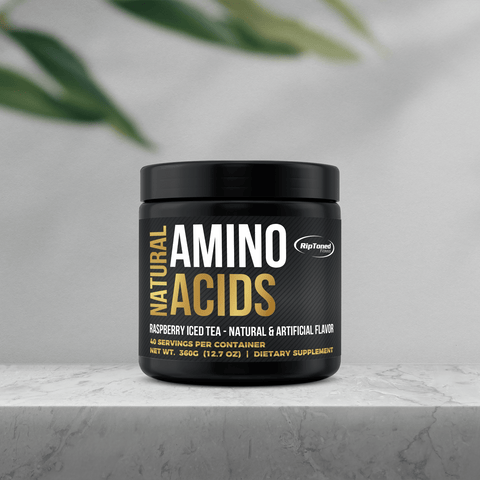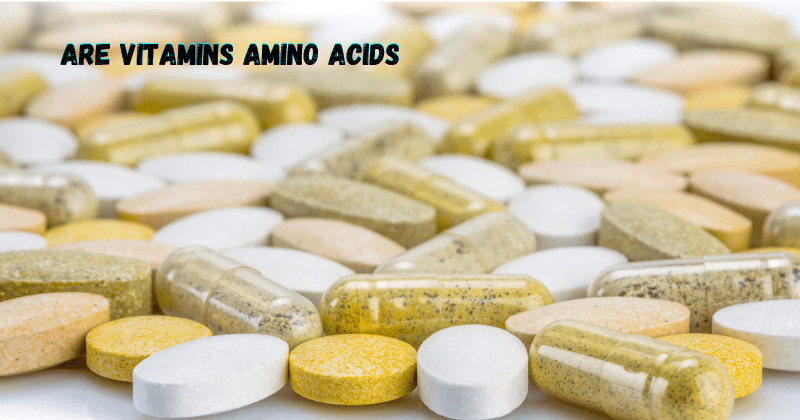Vitamins and amino acids are both essential nutrients that our body needs to function properly. Although they have different roles in the body, they work together to maintain overall health and well-being.
Vitamins are organic compounds that our body cannot produce on its own, so we need to obtain them from food sources or supplements. They are involved in numerous bodily processes, such as energy metabolism, immune system function, and growth.
On the other hand, amino acids are the building blocks for protein synthesis of proteins, which are essential for the structure and function of our cells. They also play a crucial role in various bodily functions, including muscle growth and repair, hormone production, and neurotransmitter synthesis. In this article, we will answer the Are Vitamins Amino Acids question by discussing their similarities, differences, and overall importance for our health. Let's dive in!
Similarities Between Vitamins and Amino Acids
Although vitamins and amino acids have distinct roles, they share some similarities in terms of their functions and sources.
Firstly, our bodies cannot naturally produce both vitamins and amino acids, so we need to obtain them from external sources. Vitamins are found in various plant and animal-based foods, while amino acids can be obtained through dietary proteins such as meat, dairy, and legumes.
Moreover, vitamins and amino acids are vital in maintaining proper bodily functions. For instance, certain vitamins act as antioxidants that protect our cells from damage caused by free radicals. Similarly, some amino acids serve as antioxidants and help remove harmful substances from our bodies.
Furthermore, both vitamins and amino acids are essential for growth and development. Vitamins such as vitamin D and calcium are crucial for bone health, while amino acids like leucine stimulate muscle growth.
Another similarity between these two nutrients is that their deficiency can lead to various health complications. For instance, a lack of vitamin C can cause scurvy, and insufficient levels of essential amino acids can result in protein malnutrition.
Differences Between Vitamins and Amino Acids
Despite their similarities, vitamins and amino acids have distinct differences in chemical structure and functions.
Vitamins are organic compounds that contain carbon, hydrogen, and oxygen atoms. They can be water-soluble or fat-soluble, meaning they are either dissolved in water or stored in fat tissue. Water-soluble vitamins, such as vitamin C and B-complex, are not stored in the body and must be replenished daily. In contrast, fat-soluble vitamins like vitamins A and D can be stored in the liver and fatty tissue for later use.
On the other hand, amino acids are organic compounds that contain carbon, hydrogen, oxygen, and nitrogen atoms. They are classified as essential or non-essential based on whether our bodies can produce them. The human body cannot produce essential amino acids, such as leucine and valine, so we need to obtain them from food sources.
Moreover, vitamins and amino acids differ in terms of their functions in the body. Vitamins are primarily involved in metabolic processes, whereas amino acids have a more structural function. Amino acids are the building blocks of proteins, which are crucial for the structure and function of our cells.
Are Vitamins, Amino Acids
Now, the main question - are vitamins and amino acid supplements or acids? The answer is no. While both nutrients play important roles in maintaining our overall health, their chemical structures and functions differ significantly. Vitamins are organic compounds, while amino acids are the building blocks of proteins.
However, it's worth noting that some vitamins contain amino acids as part of their structure, such as vitamin B12, which contains cobalt and the amino acid alanine. Moreover, certain amino acids can act as glutamic acid and precursors for vitamins, such as tryptophan, which is necessary for the production of niacin (vitamin B3).
Additionally, some vitamins and amino acids work together to carry out certain functions in the body. For example, vitamin C helps with the absorption of iron, an essential mineral that is needed for red blood cell production. At the same time, the amino acid lysine plays a very important role in collagen formation, which is necessary for wound healing.
Benefits of Vitamins and Amino Acids
The main benefits of vitamins and amino acids are improved immune function and overall health and well-being. These nutrients are crucial in maintaining various bodily and physical functions, including metabolism, immune system function, and growth.
Moreover, consuming a diet rich in vitamins and amino acids can help prevent deficiencies that can lead to various health complications. For instance, getting enough vitamin D and calcium can promote bone health, maximum nourishment, and reduce the risk of osteoporosis while consuming enough essential amino acids can prevent protein malnutrition.
Furthermore, certain vitamins and amino acids have been shown to have specific benefits for our health. For example, vitamin C has antioxidant properties that can help protect against chronic diseases such as heart disease and cancer. Amino acids like tryptophan have been linked to improved mood and better sleep quality.
Recomended Intake of Vitamins and Amino Acids
To ensure adequate intake of vitamins and amino acids, consuming a balanced diet that includes a variety of nutrient-dense foods is recommended. The recommended daily intake of vitamins varies depending on the type and age group. For example, the recommended daily intake for vitamin C is 75-90 mg for adults sufficient quantities, while the recommended daily intake for vitamin D is 600-800 IU.
Similarly, there are different recommendations for amino acids depending on age and health status. For example, the recommended daily allowance (RDA) for leucine is 42 mg per kilogram, a small body weight for healthy adults.
Moreover, certain lifestyle factors may increase the need for vitamins and amino acids. For example, pregnant women may require higher levels of folic acid and iron to support fetal development, while individuals with certain medical conditions may need additional supplementation.
It's important to note that consuming excessive amounts of vitamins or amino acids can also have negative consequences on our health. Therefore, it's essential to follow recommended intake guidelines and consult a healthcare provider before taking supplements.
How to Incorporate Vitamins and Amino Acids in Your Diet
The best way to incorporate vitamins and amino acids into your diet is by consuming a variety of whole, nutrient-dense foods. Fruits, vegetables, whole grains, lean proteins, and healthy fats are all excellent sources of these essential nutrients.
For vitamins, it's recommended to consume a variety of colorful fruits and vegetables, as they contain different types of vitamins and minerals. For example, oranges are rich in vitamin C, while carrots are high in beta-carotene (which converts to vitamin A). Whole grains like brown rice and quinoa also provide B-complex vitamins.
In terms of amino acids, it's essential to consume a variety of protein sources, as different foods contain different types of amino acids. For example, animal-based proteins like chicken and fish are high in essential amino acids, while plant-based proteins like beans and quinoa are rich in non-essential amino acids.
Additionally, incorporating fermented foods like yogurt and tempeh into your diet can increase the intake of certain vitamins (such as B12) and improve the absorption of amino acids.
In cases where individuals are unable to meet their vitamin and amino acid needs through diet alone, supplementation may be necessary. However, it's important to consult a healthcare provider before adding supplements to your routine.
Risks of Vitamin and Amino Acid Deficiencies
Here are the risks of vitamin and amino acid deficiencies:
- Vitamin A deficiency can lead to vision problems, weakened immune system, and skin issues.
- Vitamin C deficiency can cause scurvy (which leads to fatigue, bleeding gums, and joint pain).
- Vitamin D deficiency may result in bone diseases like rickets (in children) or osteomalacia (in adults).
- Iron deficiency can cause anemia (which leads to fatigue, weakness, and shortness of breath).
- Protein deficiency can cause muscle wasting, weakened healthy immune systems, and delayed wound healing.
These are just a few examples of the potential risks associated with vitamin and amino acid deficiencies. However, it's important to note that these deficiencies are preventable through a well-balanced diet that includes a variety of whole, nutrient-dense foods.
FAQs
Does cooking affect the vitamin and amino acid content of food?
Cooking can potentially reduce foods' vitamin and amino acid content, depending on the cooking method used. For example, boiling vegetables can cause water-soluble vitamins (such as vitamin C) to leach into the cooking water. However, some cooking methods (like steaming or roasting) may help retain more nutrients.
Can I get all the vitamins and amino acids I need from food alone?
Yes, it is possible to meet your vitamin and amino acid needs through diet alone by consuming a variety of nutrient-dense foods and aspartic acid. However, in certain cases, side chains (such as pregnancy or medical conditions), supplementation may be necessary to ensure adequate intake.
Can I take too many vitamins or amino acids?
Yes, consuming excessive amounts of vitamins and amino acids can have negative consequences on our health. It's essential to follow recommended intake guidelines and consult a healthcare provider before taking supplements.
Conclusion
In conclusion, vitamins and amino acids are essential for our health and well-being. Consuming a proper balance diet that includes a variety of whole, nutrient-dense foods is the best way to ensure adequate intake. However, in certain cases, supplementation may be necessary.
It's important to pay attention to recommended intake guidelines and consult a healthcare provider before adding supplements to our routine. Incorporating these nutrients into our diet can improve sleep quality, central components, and overall health.
So, it is important to prioritize nutrient-dense foods and maintain a healthy lifestyle for optimal well-being. With the right intake of vitamins and amino acids, we can achieve better sleep quality and enhance our overall health and vitality.

Check out Rip Toned's Vitamins Amino Acids here

